The Building Bridges Initiative(BBI) Journey
Building Bridges Initiative(BBI) arose from President Uhuru Kenyatta and Raila Odinga's collaboration following their historic handshake on March 9, 2018. Its beginning was a success before it become a controversial amending procedure.
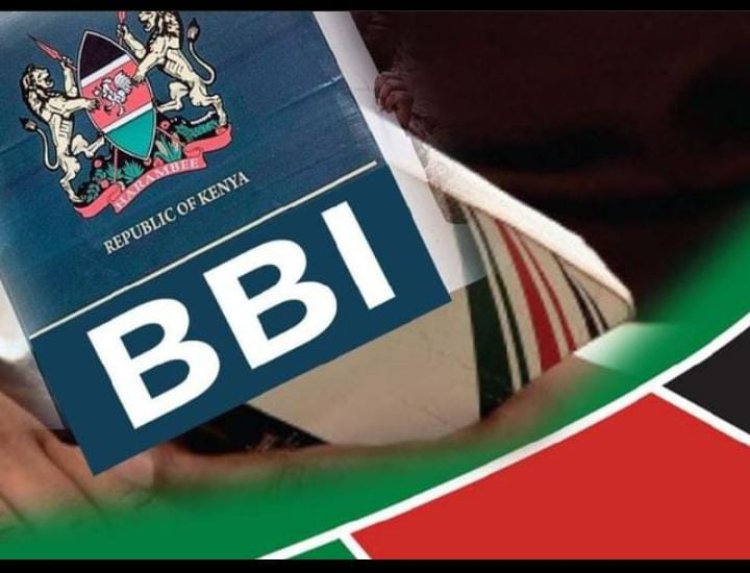
Following the handshake, Uhuru and Raila announced their new ambitions for the country on the steps of Harambee House, outlining what they called the nine-point agenda, which highlighted some of the challenges they claimed were afflicting the country.
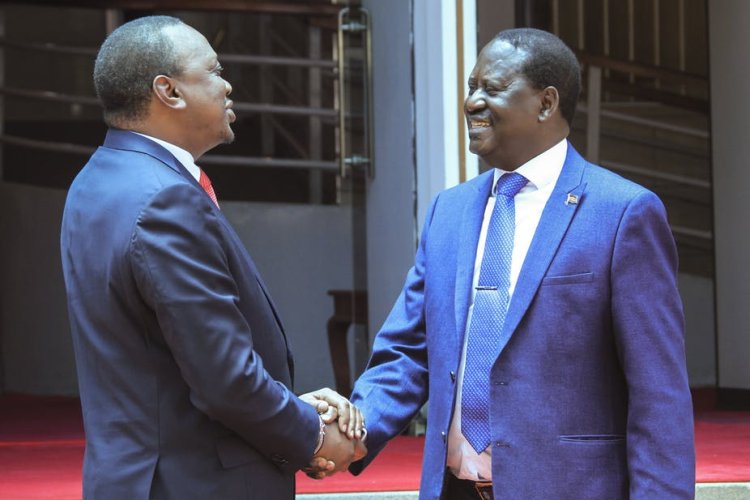
Handshake between President Uhuru Kenyatta and Raila Odinga in 2018. PHOTO FILE
The nine-point agenda in the BBI included:
- Corruption
- Lack of national ethos
- Devolution
- Divisive elections
- Safety and security
- Responsibilities and rights
- Inclusivity
- Shared prosperity
- Ethnic antagonism and competition
Throughout the process, President Uhuru Kenyatta, Raila Odinga, and their allies stated that the amendment process attempted to bring Kenyans together and share leadership posts and resources more evenly across the country. On the other hand, the BBI caused a schism between Uhuru and his Deputy William Ruto, who remains a vocal opponent of the initiative.
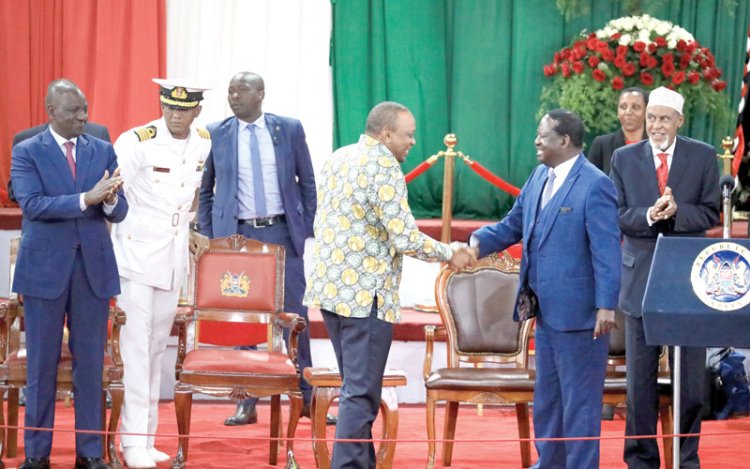
President Uhuru Kenyatta, Deputy President William Ruto, and Opposition leader Raila Odinga at Bomas of Kenya during the BBI launch. PHOTO FILE
A task committee was formed which produced an interim report in November 2019 outlining suggestions for issues that Kenya needed to address, which they stated would necessitate a constitutional modification.
President Uhuru established the Steering Committee on the Implementation of the Building Bridges to a United Kenya Task Force in January 2020, with 14 members and a secretariat made up of both Uhuru and Raila delegates. The committee was given the deadline of June 30, 2020, to provide its full study of BBI.
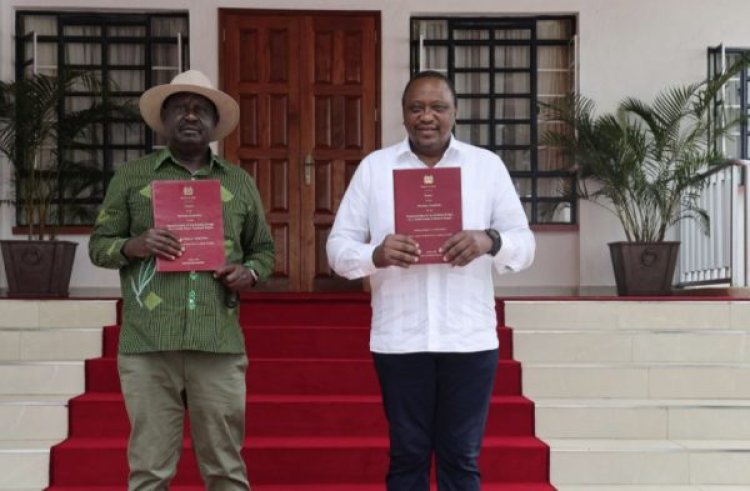
President Uhuru Kenyatta and Raila Odinga. PHOTO FILE
The BBI had recommended, among other things, the establishment of a Prime Minister that would be nominated by the president. Two members of the cabinet would serve as his deputies.
It also advocated raising funding allocation to devolved areas by at least 35% and creating an official opposition leader's office with a shadow cabinet.
It aimed to create an additional 70 constituencies, as well as a half-cabinet made up of members of parliament who would grant new and small enterprises tax breaks of up to seven years.
The president would chair the cabinet, which would include a deputy president, prime minister, and ministers. The two-to-five-year presidential term limit would stay in place.
After several campaigns in the country and meetings held in the parliament, the majority of County Assemblies, the National Assembly, and the Senate all voted in favor of the bill.
The High Court and the Court of Appeal both dismissed the attempt to modify the Constitution through the BBI, declaring the Constitution (Amendment) Bill, 2021, null and void.
The question of whether the Independent Electoral and Boundaries Commission (IEBC) was lawfully constituted when it approved the Bill, as well as the legality of the proposed new 70 seats, was also brought up.
Another dispute was whether a referendum ballot should contain one or many questions, as well as whether the BBI met the participation criteria, both of which the Supreme Court addressed.
The proposal to create extra seats was declared to be illegal by the High Court and Court of Appeal because the Independent Electoral and Boundaries Commission (IEBC) is responsible for delineating boundaries.
The IEBC lacked a quorum to conduct substantial business and adopt the BBI, according to the High Court and the Court of Appeal.
The courts ruled that the popular initiative belongs to ordinary persons.
Activists who opposed the initiative first filed a complaint in the High Court contesting BBI. They sued Attorney General Kihara Kariuki, National Assembly Speaker Justin Muturi, Senate counterpart Ken Lusaka, and the Independent Electoral and Boundaries Commission (IEBC).
The cases questioned the content of the BBI Bill as well as the procedure by which it was drafted. They questioned whether or not actions had been made, or were planned, to modify the Constitution.
On Thursday, March 31, Chief Justice Martha Koome declared that public participation was insufficient during the implementation of BBI changes related to boundary delimitation. In her decision, she stated that the constitutional amendment procedure was not sufficient in this regard.
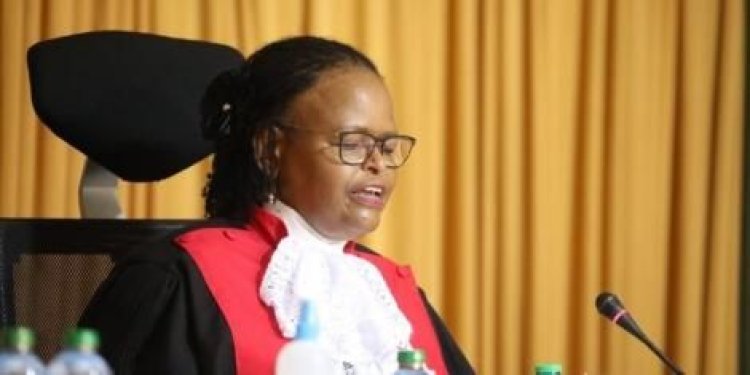
Chief Justice Martha Koome.PHOTO FILE
The Chief Justice also found that President Kenyatta went over his mandate when he used the public initiative mechanism to amend the Constitution.
From the Supreme Court ruling, the BBI amendment bill was unconstitutional; six of the seven judges ruled that the president cannot lead a popular initiative to amend the constitution.
It should be noted that the end of the road will be if the judges deny the case and maintain the High Court and Court of Appeal decisions that the BBI was unconstitutional.


























